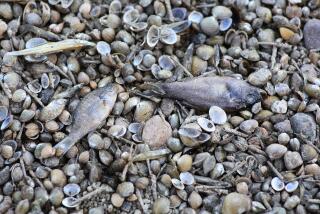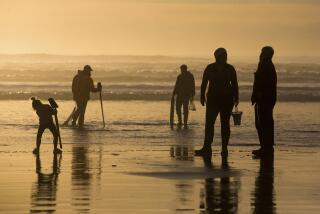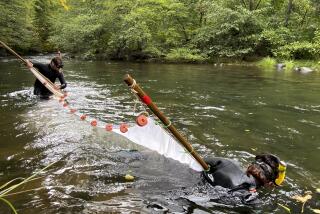Public Banned at Scenic Waterway in Maryland as Fish Kill Persists
- Share via
SHELLTOWN, Md. — As a massive fish kill continued in the Pocomoke River on Maryland’s Eastern Shore on Thursday, officials indefinitely banned the public from a nearly five-mile stretch of the scenic waterway.
The state Department of Natural Resources sent a team of scientists to the Pocomoke, where they gathered water, mud and fish samples for analysis.
The fish kill, which began Wednesday, destroyed thousands of menhaden, rockfish, croakers and blue crabs and marked a dramatic escalation of problems on the Pocomoke that began last fall, when local watermen began reporting gaping red sores on fish.
Officials have not determined the cause of the fish lesions but are following procedures developed by North Carolina researchers to test for Pfiesteria piscicida, an obscure microorganism that eventually was pinpointed as the cause of massive fish kills in that state.
With water samples taken Wednesday from the Pocomoke, officials said they hope to have some preliminary indications by today whether Pfiesteria is responsible for the lesions and the dead fish.
After conferring with state health and environment officials, Somerset County Health Officer Curtis Dickson closed the Pocomoke River because of a potential health threat to humans and because people were not heeding the advisory to stay away from the water.
Pfiesteria, a single-cell microorganism, moves through 24 stages and is harmful to fish in several of those stages. Scientists don’t fully understand how Pfiesteria in an unharmful state becomes dangerous, but they know that it thrives in water polluted with nutrients, such as nitrogen, which can wash off farm fields or be emitted by sewage-treatment plants.
More to Read
Sign up for Essential California
The most important California stories and recommendations in your inbox every morning.
You may occasionally receive promotional content from the Los Angeles Times.










